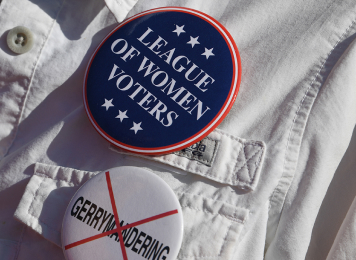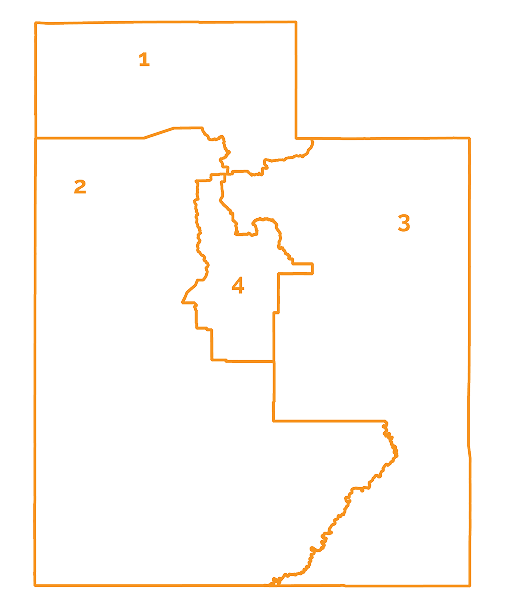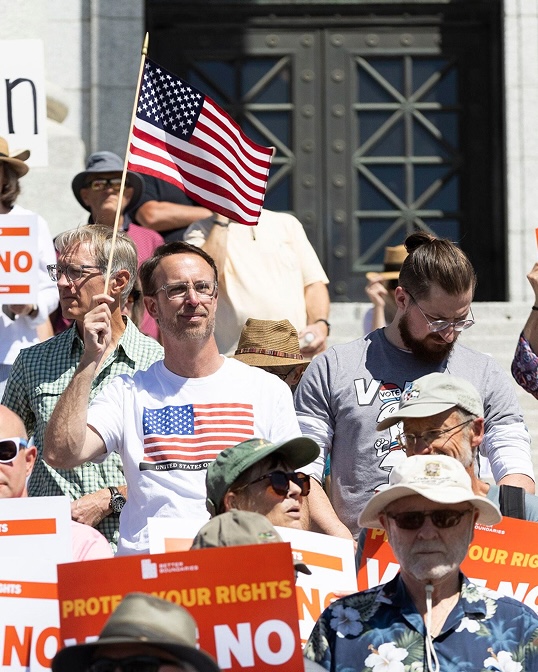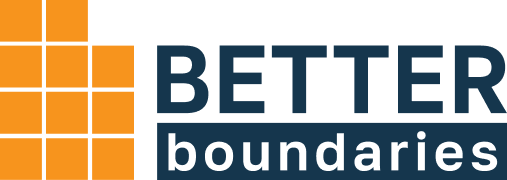Our Mission

Too often in Utah, political power is concentrated in the hands of a few at the expense of voters.
Gerrymandered maps, efforts to weaken citizen-led initiatives, and reduced accountability are part of a broader pattern: a slow erosion of democratic checks and balances. These shifts, regardless of who’s in charge, threaten fair representation and distort the public’s voice. At Better Boundaries, we’re working to reverse this trend, because voters should choose their leaders, not the other way around.
Problem One
Politicians Are Choosing their Voters
In Utah, the redistricting process is controlled entirely by the state legislature. After every census, lawmakers draw new boundaries for state legislative and congressional districts.
Following the 2020 Census, the Utah Legislature approved new congressional and state legislative maps that changed how communities across the state are represented. Among the most controversial changes was the decision to split Salt Lake County into all four congressional districts, diluting the political influence of urban voters and dividing communities with shared interests. The maps were passed during a one-day special session, without amendments and against the recommendations of the independent redistricting commission.
Public trust in the redistricting process dropped as Utahns from across the political spectrum questioned whether the maps were drawn to protect political power rather than reflect voters.
When elected officials draw their own districts, it opens the door to partisan gerrymandering. In Utah, this has led to less accountability, fewer choices for voters, and communities split in ways that serve politicians, not the people who live there.

Problem Two
The Citizen Initiative Process Is Under Threat
“All political power is inherent in the people; and all free governments are founded on their authority for their equal protection and benefit, and they have the right to alter or reform their government as the public welfare may require.”
— Utah Constitution, Article I, Section 2
Utah’s constitutionally-protected right to citizen-led initiatives—where voters can directly propose and pass laws—has long served as a tool for the public to act when lawmakers won’t. But following a series of high-profile initiatives, including the one that created Utah’s redistricting reform, the legislature has taken deliberate steps to weaken this process.
In 2018, Utah voters approved three major ballot initiatives:
- Proposition 2: Legalizing medical cannabis
- Proposition 3: Expanding Medicaid
- Proposition 4: Creating an independent redistricting commission
All three initiatives passed with strong public support across party lines. But within months, the legislature amended, replaced, or significantly delayed each one.
In the case of Proposition 4, the connection to redistricting reform was direct. After voters created a check on gerrymandering, lawmakers passed S.B. 200 in 2020, stripping the new commission of its authority. This move not only undermined Prop 4, it sent a message that even voter-approved changes were not safe from legislative control.
Since then, the Utah Legislature has taken a series of steps that make it harder for future initiatives to succeed. For example, Lawmakers have delayed when initiatives take effect, made it easier to pressure people to remove their signatures, and blocked similar initiatives from being refiled for years. They’ve raised signature requirements, added new red tape, and proposed giving themselves the power to overturn what voters approve at the ballot box.
Most recently, they’ve required initiative sponsors to estimate tax impacts, justify how the proposal would be funded, and publish the full initiative text in newspapers statewide—rules that increase the complexity and burden of running a citizen-led campaign.
Taken together, these changes show a clear trend. Instead of making the process more transparent or accessible, the Legislature has steadily chipped away at the ability of everyday Utahns to bring forward and pass ballot initiatives.
Problem Three
Checks and Balances Are Being Dismantled
When the people or the courts push back, those in power sometimes try to change the rules. We’ve seen it with gerrymandering. We’ve seen it with efforts to limit citizen-led initiatives. And now we’re seeing it with proposals that weaken judicial independence and restrict access to voting. These are all symptoms of the same problem—elected officials consolidating power by removing the checks that keep them accountable.
Utah courts have ruled against the Legislature on several high-profile issues, including redistricting. In response, some lawmakers have proposed changing how judges are selected. S.B. 296 would have ended the long-standing practice of allowing Utah Supreme Court justices to choose their own Chief Justice. Instead, it gave that power to the Governor, with Senate confirmation, and required reappointment every four years. Legal experts warned this would make the Chief Justice more vulnerable to political pressure. Governor Spencer Cox vetoed the bill, saying it could force judges to think twice before ruling against the executive branch. Still, the Legislature passed it, signaling a growing trend of political influence over the judiciary.
Other bills target the power of voters directly. H.B. 300 moves Utah away from its widely supported vote-by-mail system by requiring voters to opt in and present additional ID. While election security matters, recent state audits found no widespread fraud. They did flag real issues like outdated voter rolls and inconsistent ballot tracking—critical areas the Legislature could and should address.
We believe in a system where power is shared, not concentrated. Whether it’s fair maps, citizen initiatives, the courts, or how we vote, the principle stays the same. The rules should serve the people, not protect those already in power.
What We’re Doing, And Where We’re Headed
At Better Boundaries, we believe Utahns deserve fair representation, a meaningful vote, and a government that listens. That’s why we’re working every day to advance reforms that strengthen our democracy and push back against efforts that silence voters.
Here’s how we’re taking action:
- Fighting for Fair Maps
We’re challenging gerrymandered districts and standing up for the right of voters, not politicians, to shape Utah’s political boundaries. Our legal victories have helped protect the power of redistricting reform and hold lawmakers accountable. - Defending the Citizen Initiative Process
We’re building coalitions to stop attempts to weaken the initiative process—from defeating harmful constitutional amendments to tracking new legislative threats in real time. When voters take action, their voices should be respected—not rolled back. - Preserving Checks and Balances
We’re speaking out against laws that disrupt the balance of power and weaken the independence of key branches of government. No single institution should be placed above the others. - Building a Better Future
Through public education, advocacy, and policy reform, we’re working toward a system where:- Fair maps serve voters—not politicians
- A balanced, protected initiative process respects voter voices
- Independent institutions that keep power in check
- Leaders reflect the people they represent
This work won’t happen overnight, but with Utahns from every background standing up for fair representation, we’re getting closer to a democracy that works for all of us.
Learn more about the work we’re actively leading to protect voter power and fair representation.

